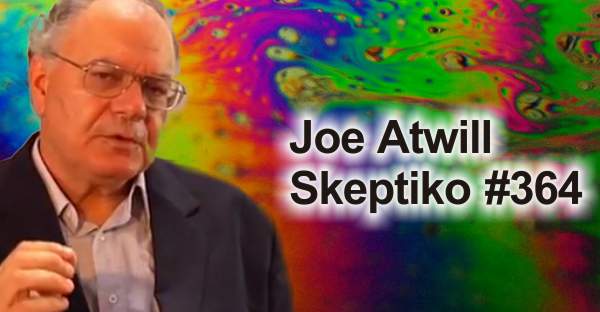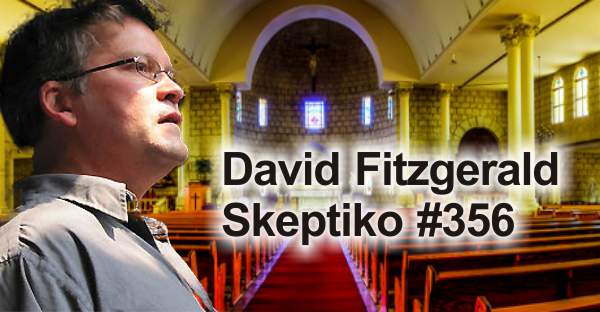Christopher Knowles, Are Occult Symbols Present in Science? |365|
Christopher Knowles finds occult symbolism in pop culture and science impossible to ignore. 
photo by: Skeptiko
(News announcer) When you celebrate science, perhaps it’s best to not get carried away. The inauguration ceremony included some, how shall we put it, original choreography.
It was quite bizarre… do you associate this kind of dancing with the inauguration of a tunnel?
The science journalists you’re listening to are commenting on the opening ceremony of the $7 billion technological marvel that is the Gotthard Tunnel in Switzerland. Here’s another report on this ceremony that the Daily Mail called, “One of the most bizarre opening ceremonies in history.”
Dancing construction workers, angels with giant heads and whatever these things are. It’s a surreal ceremony…
If you’ve read anything about this ceremony or saw video from the event, you know the uproar was about the overt, and I mean overt, occult symbology on display for some of Europe’s leading political figures.
Now look, I know sometimes a goat-headed devil looking figure being worshipped by a flying baby with wings is just good clean fun for a lot of folks, but the recurring use of these unmistakable, and again, let me stress that in the case of the Gotthard Tunnel, the symbology was not hidden — it was really, really in your face — well the use of these occult images and themes, particularly in science and in sciency pop culture, is something that’s hard to just brush aside. At least that’s the opinion of today’s guest, author and creator of The Secret Sun website, Christopher Knowles (author of, Our Gods Wear Spandex):
Christopher Knowles: We saw that Gotthard, Switzerland Tunnel, that weird hour-long ritual that so many people have commented on…
Wait a second, before I play the rest of this clip, let me point out that what’s really great about Chris’ work, is that when he tackles this stuff, he dives deep:
Christopher Knowles: The thing is, is that people just look at that and just say, “Oh that’s Satan, that’s Lucifer and blah, blah, blah, blah, blah,” and it’s like, no, you don’t understand what these people are really about, you don’t understand what is really being put across here, you don’t understand the god that this goat figure really represents. It’s not Satan, it’s not Baphomet, it’s not Lucifer, it’s a much more, almost a more troubling figure in history.
Now, if you’re not yet convinced that the gods of Mesopotamia, Egypt and Greece are really relevant to your life, you might want to take a step back and ask yourself, who does care about such things?
Christopher Knowles: In that same ceremony we see this woman with this giant baby head and these wings, sort of flown in to this tunnel, it’s just the weirdest thing. I mean, you just can’t believe you’re seeing it, it’s mind boggling. But that’s actually Eros, that’s not Lucifer. These things have specific meanings, they have specific historical context that people overlooked because they don’t understand, they don’t know the history and if you don’t know the history, you don’t know what is really being said here and you don’t know what is really being believed here. You know, you don’t understand what these people really thing.
Okay, but maybe you’re still not yet convinced that you should care. Well, let me get all Skeptiko on you, because as you know the primary focus of this show has been consciousness science and an attempt to answer the, “is there more” question. That is, are we more than biological robots in a meaningless universe? Because, if you’re not more, then you can ignore all this nonsense and chalk it up to crazy stuff that people do to entertain themselves.
But, if you don’t feel comfortable answering the question in that way, and if you feel it’s rather obvious that we seem to be embedded in a field of extended consciousness that requires us to consider such things, and may even require us to ask deeper questions like — are the gods and demons of the Gotthard Tunnel real or a creation of our collective consciousness? That’s actually a question I asked Chris:
Alex Tsakiris: So, what I hear you saying is, “Yeah, sure, there’s some reality to the thought form collective consciousness, where we put our attention we manifest,” but we have to balance that if we’re going to play this consensus reality game, which says, “I see you, you see me,” you know? We can observe things and measure things and even if that isn’t totally real, we know that’s a little bit less than literally real, we’re going to play that game because it’s useful. Then you’re saying in that same sense, “We are obliged to understand the history, understand the context in which these symbols and messages are being communicated and we can’t just chalk it up to the kind of, well, none if it’s real anyway, it’s all an illusion”:
Christopher Knowles: No, well there are two sort of polar opposite reactions. That’s one of them, that’s sort of the secular mindset that, “This is just all nonsense, I don’t need to worry about this, blah, blah, blah,” even though this is happening in a government controlled and financed context and setting. I mean, if people in the government are paying for this, they’re doing so for a reason, they’re just not doing it for jollies. But then there’s the opposite polar, maybe it’s almost like a, roughly speaking a left/right polar reaction. So the left secular reaction is like, “Oh, who cares, it’s just nonsense, it doesn’t mean anything,” and then the right reaction may be more religiously orientated, it’s like, “Well, that’s all Satanist, it’s obviously all Satanist.”
You can just dismiss it and say, “I’m going to make this all about me, I’m going to make this all about my religion, all about my belief system,” you’re not engaging with what is actually being said.
Stick around, we’re about to dive deep into Skeptiko with our guest Chris Knowles.
(continued below)
[box]
Listen Now:
Podcast: Play in new window | Download
Subscribe: RSS
[/box] [box]Subscribe:
[one_third] [/one_third] [one_third]
[/one_third] [one_third] [/one_third] [one_third_last]
[/one_third] [one_third_last] [/one_third_last] [/box]
[/one_third_last] [/box]
Click here for forum discussion
Click here for Chris’ The Secret Sun website/blog
Read Excerpts:
 Alex Tsakiris: Today we welcome Christopher Knowles to Skeptiko, Chris is the author of several books, one that you might have heard of because it drew a huge amount of justifiably positive attention a few years ago, Our Gods Wear Spandex: The Secret History of Comic Book Heroes. Chris also publishes some terrific blog posts and some remarkably extensive series on his site, secretsun.blogspot.com, which, if you’ve never checked it out, you’re in for a fantastic treat. I’ll just leave it at that.
Alex Tsakiris: Today we welcome Christopher Knowles to Skeptiko, Chris is the author of several books, one that you might have heard of because it drew a huge amount of justifiably positive attention a few years ago, Our Gods Wear Spandex: The Secret History of Comic Book Heroes. Chris also publishes some terrific blog posts and some remarkably extensive series on his site, secretsun.blogspot.com, which, if you’ve never checked it out, you’re in for a fantastic treat. I’ll just leave it at that.
Chris, welcome to Skeptiko, thanks so much for joining me.
I think that’s what we’re all about, is trying to find out, where this really connects with us on the deepest level and that is probably what you are best known for, occult and esoteric stuff that you cover again in this way that is extremely encyclopedic and historical in this, kind of grand sense, which is awesome.
The first thing I have to ask is, are you comfortable, do you think I’m correct, that that’s where you’re positioned in a lot of people’s minds and two, are you okay with that, being connected with the esoterica occult?
Christopher Knowles: Yeah, I am. In the limits of my role I sort of see myself… I mean there are a lot of people who do pop culture and esoterica and themes like that and a lot of them have much bigger audiences than I do. But when I look at the work and I look at the things that are being presented, I’m just seeing, sort of the same ideas just constantly being recycled and I know the sources, because I’ve read the sources, I know where all this stuff is originally coming from.
What I try to do, and I’ve done this on Star Trek, the themes and the interesting, intelligence people behind Star Trek, and things like the Knights Templar and Bell Labs, all these major influences on the future that we’re living in now, is I again, go back to primary source material, look at the things that other people are not looking at, make arguments that are not being made. For instance, last year I did a major series on the CIA’s project MKOFTEN, I mean most people talk about MKULTRA, and MKULTRA is sort of a buzzword, it’s sort of shorthand for MKSEARCH and BLUEBIRD and ARTICHOKE and all these different programs. But I was looking at this one particular program that started in 1966 called MKOFTEN and it was basically a program designed to weaponize the occult. This is a program that not a lot of people are familiar with and I went back and there’s not a great deal of documentation available on this program.
So, what I tried to do is…
Alex Tsakiris: It’s to [unclear 00:10:49] culture so that everyone’s scared alone, isolated and easier to control. I mean, one, do you buy that or do you think the weaponization of the occult and Satanism and all that has a more direct purpose? Why? Why do all this stuff?
Christopher Knowles: You know, you’re dealing with probably a number of different people with a number of different goals. I agree with Joe in that sense that there obviously is an interest in taking people away from institutions from organizations, from groups. Yeah, from community, things that give people [unclear 00:11:35], that give people a sense of aligning to a greater collective, because what is clear and what has been, in many cases, explicitly spelled out, is that we are meant to be consumers who just basically follow the dictates of the [unclear 00:12:01] of the dictatorship, the overclass, whatever you want to call it.
It’s that great scene and I keep going back to this in Paddy Chayefsky’s Network with Ned Beatty playing the CEO, they don’t understand, people are not necessarily motivated by that. They think that they know what’s best for the world, that they know what’s best for us, that they know what’s best for the way the world really works. They understand how things work, we don’t. We’re getting in the way. We’re lazy. We’re stupid. We’re impediments.
Alex Tsakiris: You could work yourself into that mindset that people are stupid and they’re like cattle and they need to be led and, you know, “What am I going to do?”
Christopher Knowles: Well, this is where we get to the deep spirituality, that you spoke of, and this is why I think it’s so important. I think it’s sort of important to show how this works in the world, even if you don’t necessarily agree or approve of, of certain strains of deep spirituality, what have you, but just sort of base consumerism or we see this Satanist movement that’s sort of popping up.
Without a sense of deep spirituality, without a sense of connectiveness, without a sense of even responsibility, that this isn’t just a collection of consumers and the world is not just a machine and the universe is not just this dumb attometer that willed itself into existence somehow that nobody can seem to explain, that we’re part of a community, we’re part of a family, we live in an environment that I don’t necessarily think we’re native to, so to speak, but that’s another discussion. But we live in an environment that is inter-dependent, that’s alive, it’s a living thing.
We tend to dismiss and we tend to chalk up to psychology but I personally don’t, I mean I think psychology plays a part but I think that evil has a reality, I think it has an objective reality. I believe that good has an objective reality. Maybe it’s more animistic than pantheistic but this is just the way I see the world. I see that there are currents and however you want to describe them. Maybe in the future scientists will understand this and they’ll see this is as almost like the way we see gravity or electricity or any other sort of force that we don’t necessarily visualize or can measure, but we can sense and we can see the footprints of.
Alex Tsakiris: You know, you touched on something there a minute ago that I don’t want to let pass, because it’s one place clearly where my work in Skeptiko overlapped with something you had discovered and I was really surprised when I discovered it and if I would have been a more regular reader of The Secret Sun, I probably would have caught onto it much sooner. But here I am doing parapsychology research, recapping and understanding and trying to interview both sides and I keep running into this, kind of crazy Satanism, friendly safe space Satanism, you call it, and I’ve ran into this guy Richard Wiseman who’s this big skeptic but is kind of one of the most prominent psychology educators in the UK [unclear 00:15:43] and he’s saying, “Hey man, come to the Edinburgh Secret Society, it’s cool, we’re all atheists but we like to dress up in devil costumes and do all this stuff. It’s all okay though right, because we’re all atheists right?”
Then I said that you had explored the same topic in your blog post, Safe-Space Satanism. In this case you were talking, I think, about the Detroit Satanic Temple, but it could have been any other places where this has popped up.
Tell us about Safe-Space Satanism, it’s connection to atheism, it’s strange, strange connection to atheism and scientific materialism. Tell us about that.
Christopher Knowles: Well, it’s almost like a 70s big-haired fundamentalist’s worst nightmare come true, that atheism will lead to nihilism which leads to Satanism. It’s sort of like the old [unclear 00:16:41] idea that you saw in the late 19th century, it sort of starts with the romantics. It’s this idea that it’s just a [unclear 00:16:50], it’s just dress up, it’s just play acting, you know, we’re going to go through the motions, we’re going to just sort of immerse ourselves in Satanic law and Satanic grimoires but we’re not really Satanists.
To me, how do I put this, a metaphor that I can put out here, it’s sort of like you start off drinking non-alcoholic beer but having beer parties with non-alcoholic beer, it’s almost like to me, it seems to me and people are going to take exception to this, it seems to me like a rehearsal for the real thing. It’s a way of insinuating people, that’s why I call it Safe-Space Satanism, it starts off in a safe space, it’s starts of in a, “This is just pretend, we’re just play acting.” You’re right, I mean, this is so prevalent in the kind of circles that we run in, or at least on the margins of them and to me it’s just like these symbols have power. I sense this, I’ve always sensed this, I’ve always seen this symbols and it’s like they have an innate power of their own. You can’t play with these symbols. Like I said before, you can’t play with them without playing their game. They’re on their field.
There was a very influential and powerful figure in the early Christian movement called Saint Jerome and Saint Jerome had an ongoing battle with this very hardcore fundamentalist Christian sect called the Luciferians. This is actually historically true, when you trace back to who the Luciferians actually were, they were basically the religious right of their time, they were very dogmatic, extremely hardcore. Jerome had this whole notion of forgiveness of sins and things like that, that the Luciferians just wanted nothing to do with. They were your worst religious right nightmare. That’s exactly who they were.
So Saint Jerome was so annoyed by them that he started to insinuate Lucifer into these passages in the bible and it was just sort of like a little dig and he probably didn’t think it was really going to go anywhere, it was just his way of sort of striking back at them. Not saying that they were Satanists, but that they were hardy, that they thought they were better than everyone else, that they would be struck down by God for their pride and things like that.
So, the way this plays out is that people who come later, sort of interpret that as, “He must mean Satan,” because with the rise of the Church, when the Church became a political construct, a political construct needs an in group and an out group. So we started to see the rise of this whole idea of, you know, that there would be Satanists and these Luciferians who are working to undermine the Church and this grows and grows until we see them in evil grimoires where Lucifer is a price of hell.
This is what I’m saying, you’ve got to go back to original sources, you’ve got to go back to the original history, trace this back. What Lucifer really is, is based on a Middle-Eastern God, the mythology which is that it’s almost like the myth of Icarus, where he challenges the son but the son overcomes him and this is a description of Venus the morning star, seeming to rise on the horizon before the son as an imitation of the sun, but the sun overpowers it as it rises and gains in strength.
That’s where that mythology comes from where Lucifer… which is all non-biblical by the way, this entire history that people assume is in the bible because people don’t read their bible. It’s actually not in the bible, there’s nothing about this in the bible, you know, identifying Lucifer with Satan in the morning son and blah, blah, blah, blah, blah. I mean, it’s entirely extrabiblical. Like I said, in the Vulgate Jesus is called Lucifer.
So, what I did is I just kept going further back and further back and I was just going back thousands and thousands of years and what Lucifer really draws back to is almost like a constellation of Sumerian, Arcadian and Babylonian fire gods. This is very interesting too, they were like the patron gods of a brick…
music by
[box]
More From Skeptiko

Talking to Humanity |623|
Futurist Chris Kalaboukis Sees AI as More Than a Machine One of the most fascinating..
AI Compared to What |622|
Why LLMs Are a Game-Changer for Truth There’s a lot of hand-wringing about the downside..
Pi8 Rips Rogan and Tucker |621|
Pushing AI to go deep into sentience, ET and spirituality How long will it be..
AI Being Smart, Playing Dumb |620|
Google’s new AI deception technique, AI Ethics? My Dad grew up in a Mob-ish Chicago..
I Got Your AI Ethics Right Here |619|
Conversations about AI ethics with Miguel Connor, Nipun Mehta, Tree of Truth Podcast, and Richard..
Will AI Redefine Time? |618|
Insights from Jordan Miller’s Satori Project… AI ethics are tied to a “global time” layer..
Google’s Honest Liar Strategy? |617|
AI transparency and truthfulness… Google’s AI, Gemini… $200B lost in competitive AI LLM market share...
William Ramsey, Why AI? |616|
William Ramsey and Alex Tsakiris on the future of AI for “Truth-Seekers.” [box] Listen Now:..
Buzz Coastin, Ghost in the Machine |615|
Buzz Coastin, ghost in the AI machine, AI sentience, spiking engagement metrics. [box] Listen Now:..





















